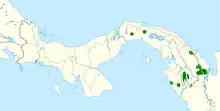Tacarcuna warbler
The Tacarcuna warbler (Basileuterus tacarcunae) is a species of bird in the family Parulidae. Prior to 2012 it considered conspecific with the three-striped warbler, and the black-eared warbler.[1]
| Tacarcuna warbler | |
|---|---|
| Scientific classification | |
| Domain: | Eukaryota |
| Kingdom: | Animalia |
| Phylum: | Chordata |
| Clade: | Dinosauria |
| Class: | Aves |
| Order: | Passeriformes |
| Family: | Parulidae |
| Genus: | Basileuterus |
| Species: | B. tacarcunae |
| Binomial name | |
| Basileuterus tacarcunae Chapman, 1924 | |
 | |
Description
The Tacarcuna warbler measures 13 cm (5.1 in) in length. It is mostly olive-brown with a buffy belly and underparts. It has distinct black and white striping on the head and a dark cheek. Male and female three-striped warblers have similar plumages.
Their song is a rapid series of squeaky chirps.
Distribution and habitat
It is found from eastern Panama to northwestern Colombia. Its natural habitats are subtropical or tropical moist montane forests and heavily degraded former forest. The Tacarcuna warbler typically forages on the ground, especially near riparian areas.
References
- Gutierrez-Pinto, N; Cuervo, A. M.; Miranda, J; Perez-Eman, J.L.; Brumfield, R.T.; Cadena, C.D. (2012). "Non-monophyly and deep genetic differentiation across low-elevation barriers in a Neotropical montane bird (Basileuterus tristriatus; Aves: Parulidae)". Molecular Phylogenetics and Evolution. 64 (1): 156–165.
- Donegan, T.M. 2014. Geographical variation in morphology and voice of Three-striped Warbler Basileuterus tristriatus. Bulletin of the British Ornithologists' Club 134: 79–109.